
Food writer Vir Sanghvi talks about eating eels and snails, chana bhatura and dahi batata puri and just why he is so fussy about bhel.
He's travelled a fair bit and he's lived in more cities than some of us have visited.
He doesn't crave for Indian food if he’s away from home for long and refuses to answer questions about his favourite dish or the best meal he’s had.
But despite his wanderings, Vir Sanghvi is a Mumbai boy.
Born and raised in (what was then called) Bombay, Sanghvi says that the city’s myriad cuisines have had a lasting effect on his tastebuds.
In an interview to Rediff.com, Vir Sanghvi, who is looking for India's best WebChef, talks about his favourite Mumbai dish, why he believes that New Delhi is now India’s gastronomic capital, and even shares the recipe of a particular salad that he loves tossing up once in a while.
In a very evocative article about Mumbai, you wrote about the gastronomic diversity of the city. Has that affected your appreciation of cuisines other than your own?
Nearly all of my appreciation of food comes from Mumbai.
Back when I was growing up, Mumbai had access to all kinds of food.
Today, Delhi is gastronomically more sophisticated than Mumbai. But in the '60s and '70s when it came to international food, the corner of (South) Mumbai I lived in, offered a very wide selection.
Gaylord restaurant offered continental (as well as Indian), there was Bombelli's (that claimed to serve authentic cappuccino) and Swiss Freddi's where I had Swiss pastries and my first hot dog. Parisian Cafe, that became Talk of the Town, also had a wide selection of international cuisine.
On the other hand, there was a chana bhatura vendor down the road from my house, Satkar that served Udupi cuisine and Purohits that served Gujarati fare.
Having said that, when I went to boarding school in Ajmer I realised that there was a lot I was not exposed to.
For instance, I hadn’t heard of rajma or paneer because no Gujarati I knew of ate rajma.
What dish brings back childhood memories?
Oh that’s simple. It’s dahi batata puri!
For most people bhel puri is the taste of Mumbai; for me it is dahi batata puri.
There's the puri, perhaps some chana, moong and some chutney. It crunches with a plop in your mouth. It's the ultimate Bombay dish for me.
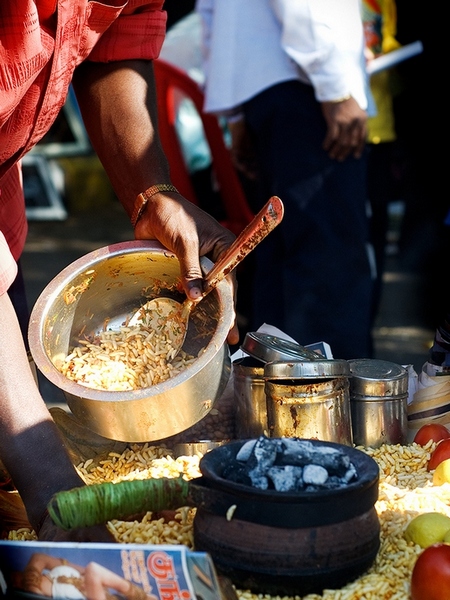
You have written eloquently about street food in a recent column. What are your top five street food dishes/drinks?
Dahi batata puri of course tops the list.
Bhel-puri
Now unlike many people, I wasn't introduced to bhel at Chowpatty.
Gujarati families of a certain generation would often have dry bhel and chutney readily available at home.
They'd add boiled potatoes and chopped onions. Because it wasn't had at a roadside stall, you had some say in how much of which chutney you wanted.
Chana bhatura
Like all great street foods, chana bhatura is a meal dish.
It is also something you make at home, or is served in restaurants and is filling, unlike dahi puri and bhel puri.
My first food memory is that of chana bhatura sold by a vendor down the street from where I lived.
He mixed these spicy chanas, two types of chutneys, some sliced onions and re-heated some pre-fried bhaturas (he wasn’t permitted to fry them on the street) on a griddle and serve them to us.
Aloo Tikki
Yet again, something I quite enjoy with the chanas and the chutneys but only in north India.
Khao man gai
The only non-veg street food I enjoy is a variation of khao man gai, a Thai street dish.
Khao man gai is chicken served with rice made in stock. Only I prefer the chicken fried.
It’s spicy, cut into bits and because it’s fried, the chicken has a special texture to it.
I could live off it for days.
You are one of the few journalists who is as serious about politics as you are about food. What got you so interested in food that you began writing about it?
I was always interested in eating because my parents and I travelled a fair amount.
When I came back from Oxford in 1979 and started Bombay magazine, I was keen that food should be a very important part of it.
At that stage, with the exception of Jiggs Kalra and Busybee, no one ever wrote about food.
So I started doing restaurant reviews for the magazine.
Then I went back to England for a while and when I came back, Vinod Mehta had started Sunday Observer and I suggested we do anonymous restaurant reviews.
The paper wasn't very rich so I said I'd pay for them myself.
I started reviewing under a pseudonym, Vikram Sinha, which did extremely well for the first two years till people worked out who I was.
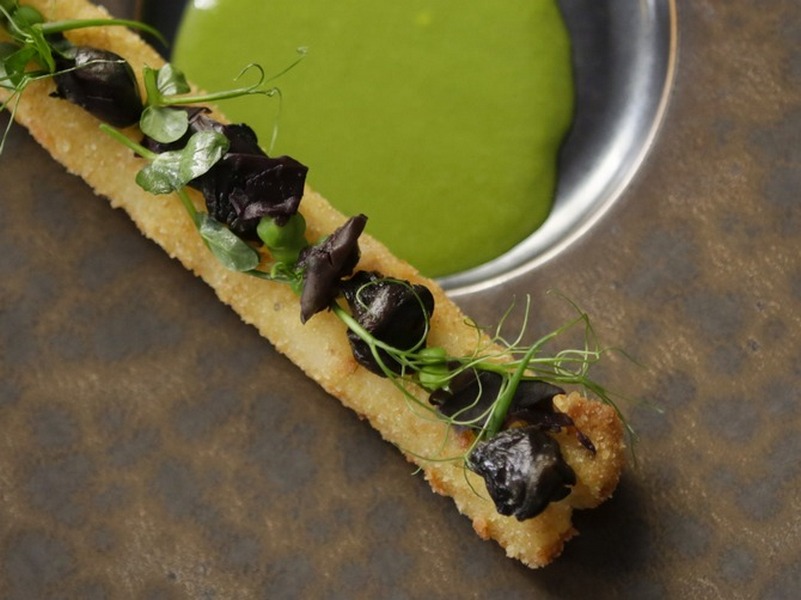
Do you cook? What is your specialty?
Yes, but very badly!
I am currently obsessed with steak.
Making steak can be a bit of a challenge depending upon the thickness of the beef, the fire, etc.
If the meat is good, you can make as good a steak at home as you would get for $200 in a restaurant.
I am also obsessed with these tiny sweet French peas.
They start losing their sweetness as soon as they are taken out of the pod, so you have to buy them frozen.
I enjoy them so much that I end up inventing things to eat them with.
Here’s the recipe for one such salad:
Was there a dish you were apprehensive of trying but fell in love with when you did?
I was never sure how I would react to sushi. The idea of raw fish and meat struck me as being odd. But when I tried it, I liked it.
I have always had a problem with parts of animals like the brain, kidneys and liver.
The only liver I eat is foie gras because it doesn’t taste like liver.
I was nervous about trying frog’s legs but when I did eat them at a restaurant in London, I thought they tasted like chicken and found them quite boring.
I approach a lot of these so-called exotic foods with a degree of caution.
In Thailand people eat locusts; I couldn’t get around to eating them.
I am fairly conservative; I cannot do the kind of extreme eating that people like Anthony Bourdain do.
What is the most extreme you have gone?
I haven't ventured beyond snails, which I love.
So, no reptiles for you?
I've been offered snakes more times than I can remember.
I have eaten eel in a Japanese restaurant but I have no great affection for it.
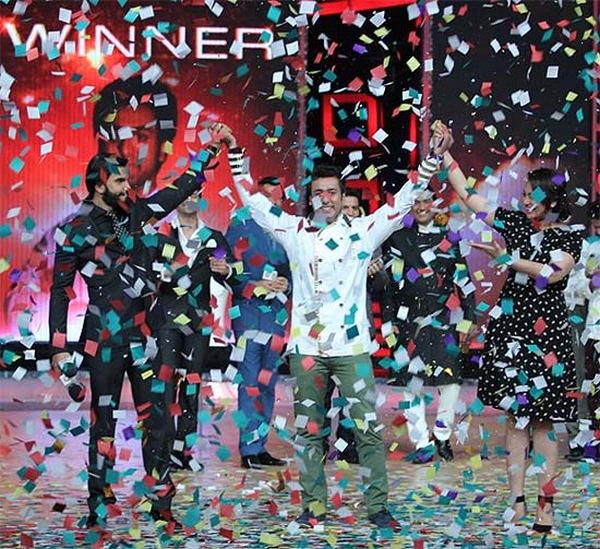
Are there any dishes you've discovered at people's homes and loved?
My aunt Sushila (Subodh) was an enterprising woman. In the '60s when most of us hadn't even heard of pizzas, she used to make them at home!
Then in the '70s at the home of Camellia Punjabi, I discovered Thai cuisine, which I loved.
More recently, Hema Deora (wife of Rajya Sabha MP, Murli Deora) cooked for me a wonderful Maharashtrian meal. I loved all of it, but the vaal (broad beans) preparation she made stood out.
The Internet has changed the way we eat. What is your take on crowd-sourced restaurant reviews?
AA Gill, the food critic of the Sunday Times (London), wrote recently that the current orthodoxy in food reviewing appears to be that the views of the thoughtful well-educated and knowledgeable person are worth much less than the views of 20 idiots.
But that's one way of looking at it.
I believe that crowd-sourcing has its place.
It depends on how you treat reviews.
For instance if you are watching a movie, would you trust the review of a critic you respect or the box office collections, which essentially are crowd-sourced reviews?
I think there is a place for crowd sourcing but I think the role of the critic will survive in the same way it has in films and art.
What are your thoughts on the countless food shows on television?
A cookery show is the entertainment television equivalent of a panel discussion on a news channel.
News channels no longer bother to (send reporters to) do stories because it costs too much.
It is better to have the hardest working desk in Delhi and have three people shouting at each other because it doesn't cost you a lot.
Cookery shows are like that. Once you have a studio, anyone can come and cook whatever they want. It doesn't cost anything.
I am not much in favour of that. I prefer more adventurous food programming.
Even though MasterChef India had its critics I thought it was an attempt to do something interesting.
NDTV did a show called Foodistan -- for which I was the judge. I don't think they made any money on it, though. But it was an attempt to do something differently.
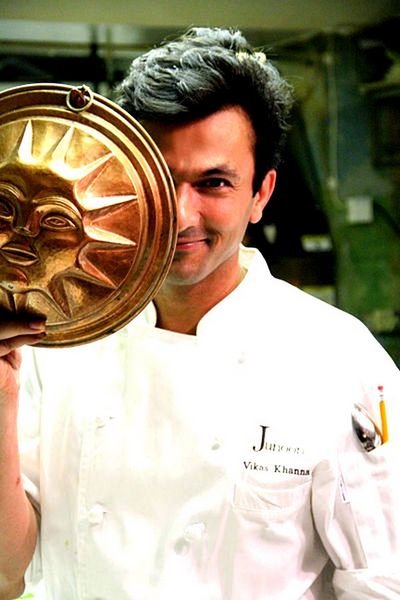
Which Indian celebrity chefs do you admire?
Sanjeev Kapoor has played a huge role in raising food consciousness in India.
Vikas Khanna is yet another name. I shot with him and he was mobbed wherever he went. He’s become a star no one had thought was possible.
Kunal Kapur, who stars in MasterChef, also has huge potential.
What is the latest cuisine making waves?
Peruvian is the trendy cuisine everyone’s talking about. It should reach India later this year.
Koya in London has been a huge success as has Sushisamba and suddenly the world has discovered South American food.
The best quote you've read about food
It's by (GK) Chesterton: There is more simplicity in the man who eats caviar on impulse than in the man who eats grape-nuts on principle.
Food is about that. It isn't about principles; it is about impulse.
What city in India according to you serves the best food?
That has to be New Delhi.
New Delhi has a more sophisticated palate and has a lot more chef-driven restaurants than Mumbai.
Ritu Dalmia' opened some, Julia has opened Tres, Nira Singh has opened Chez Nini and Rahul Akerkar is opening (Indigo) soon.
All of these are expressions of what the chefs are doing.
Restaurants in Mumbai are businesses; they are owner-driven. Rahul Akerkar is an exception.
There are very few chefs in Mumbai who strike me as having passion in a way of expressing themselves.
I have had some very bad meals in Mumbai recently.
I do like Soam but that's not exactly a great restaurant. It serves simple Gujarati food.
I just ate at Masala Library (in Bandra Kurla Complex) where there is a young chef called Saurabh who I think will be a big star.
But beyond that there’s no one really to speak of.
What, for you, constitutes a good restaurant?
One where the food is good and you can eat in comfort.
I am very old fashioned that way. I don't believe a lot in great ambience or good service; for me it’s about the food.
And what, for you, constitutes good food?
I don't think there's any great definition of good food.
I recently ate at Masala Library. The first course had these 'wow' dishes that were not good at all.
Then the chef made some simple food -- kheema pao, duck in a Kashmiri gravy and papad ki subzi (among others) -- and that was outstanding.
Often chefs try and be what they are not; if they just make simple good food, it works.
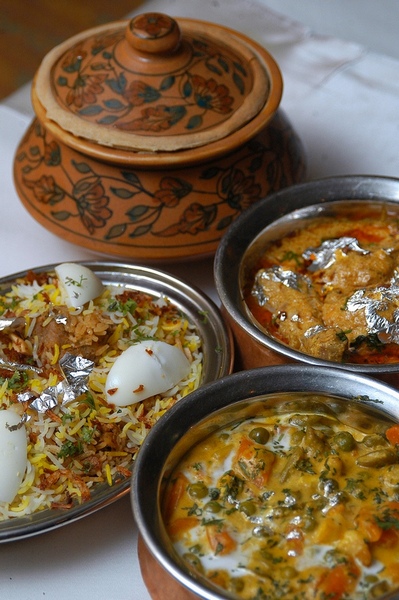
Finally, if you were to chalk out a two-week foodie travel itinerary for India what would it be like?
I'd possibly spend both the weeks in the south, starting with and spending most time in Kerala.
You have at least three distinct cuisines in Kerala -- the cuisine of the Muslim community whose biryanis are outstanding but are little-known outside the region
There is the cuisine of the Syrian Christians that has pork and beef. And of course there is the Hindu cuisine with its appams and avial.
Then, two days in Hyderabad because again it boasts of two distinct cuisines:
The first is essentially Lucknowi cuisine which when it moved south with the Mughals met with the spices and sour flavours of Andhra
And you have Andhra cuisine, which is a wonderful fiery hot cuisine and deserves to be known better outside.
And finally you have the food of Karnataka that we in Mumbai think of as 'Madrasi' food.
In essence it is Mangalorian because its roots are in the Udipi region.
Besides the idlis and dosas, the cuisine also boasts of some wonderful seafood.
So I would probably wind it up there and not go up north at all!